Education Partnerships at Stanford and Beyond
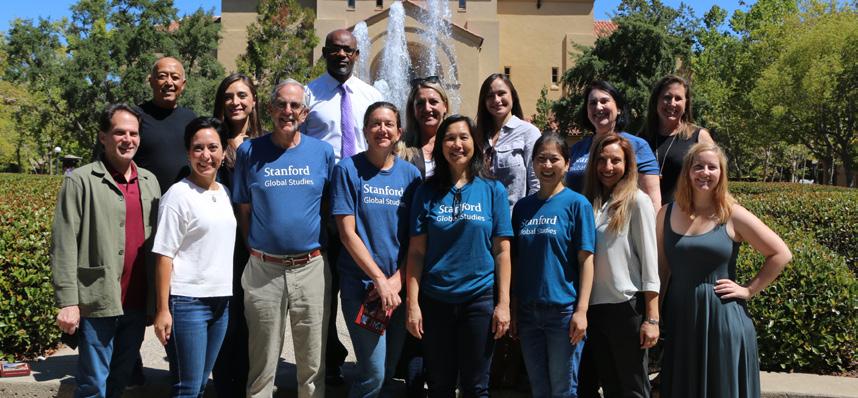
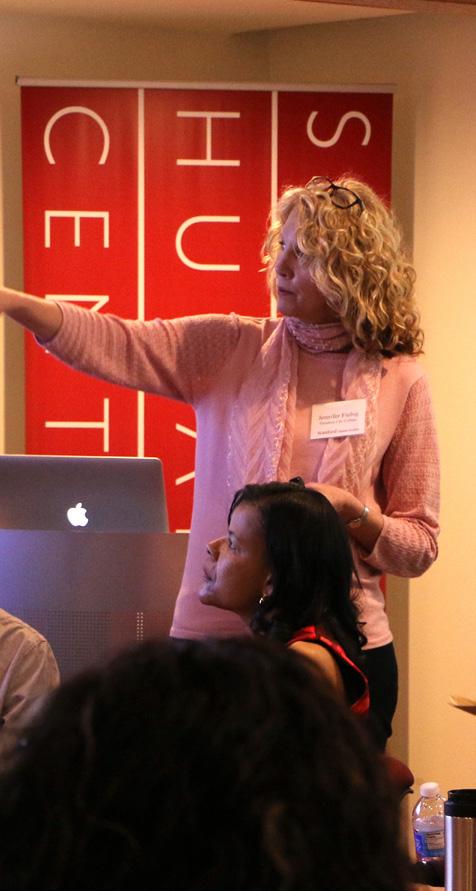
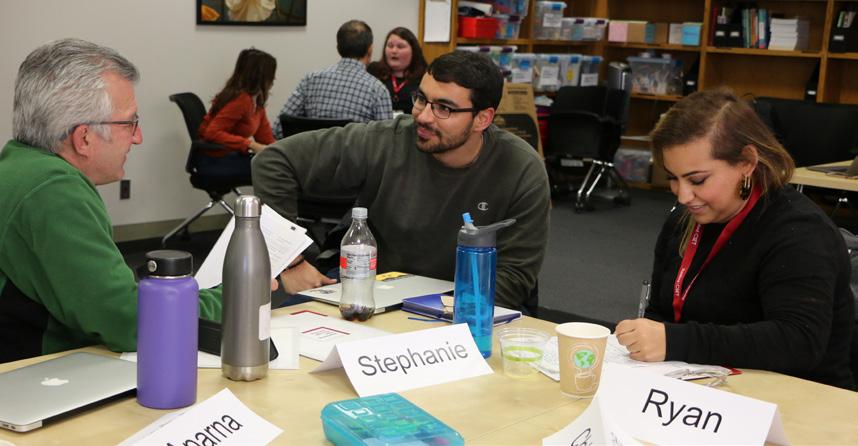
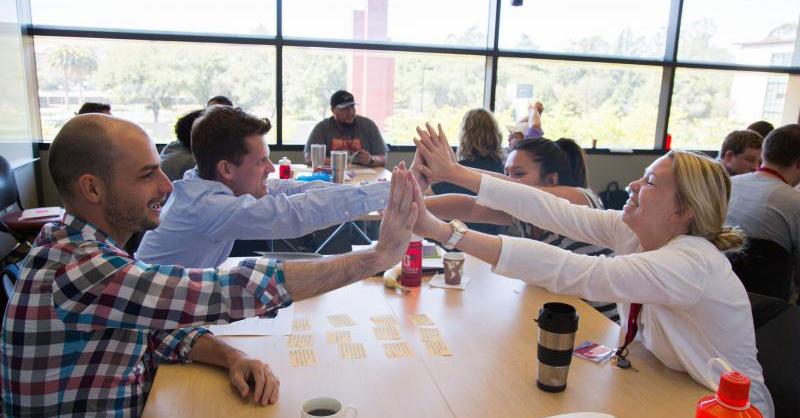
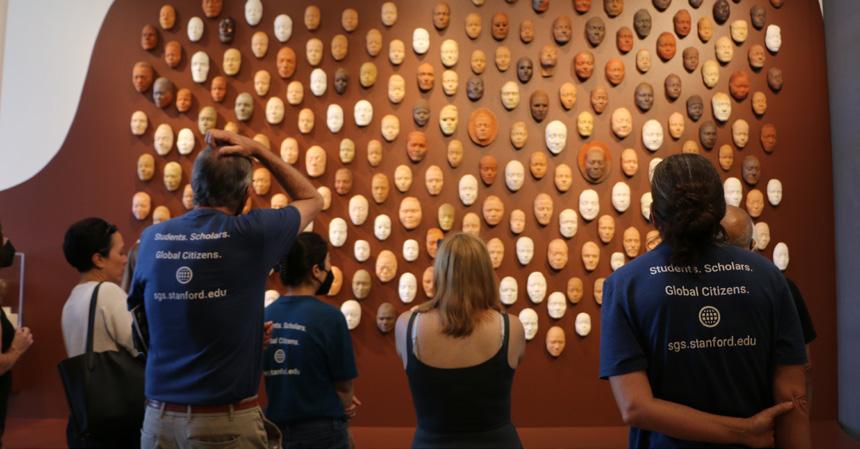
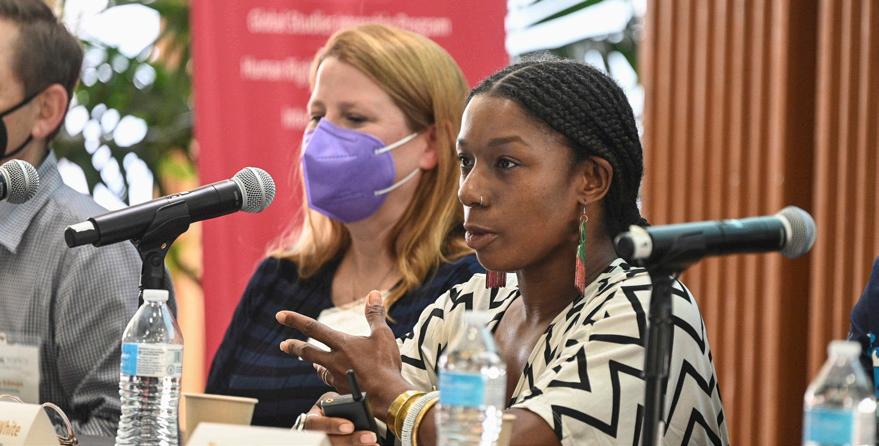
Highlights from Stanford’s Title VI National Resource Centers for Foreign Language and Area Studies
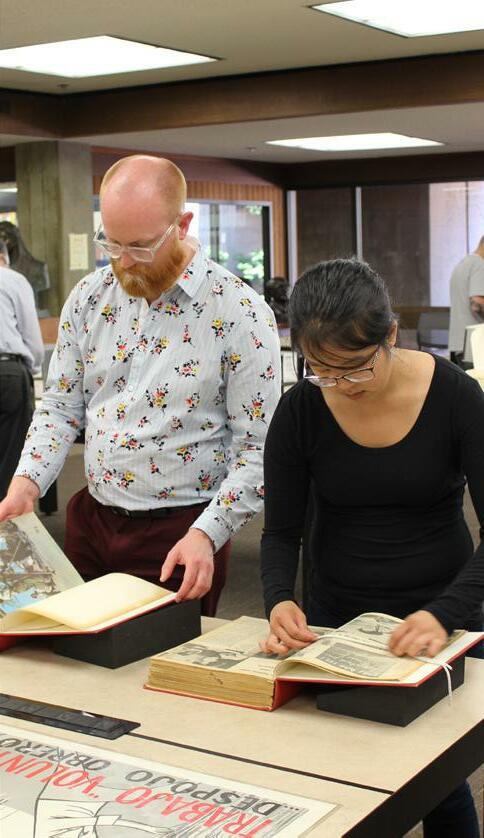
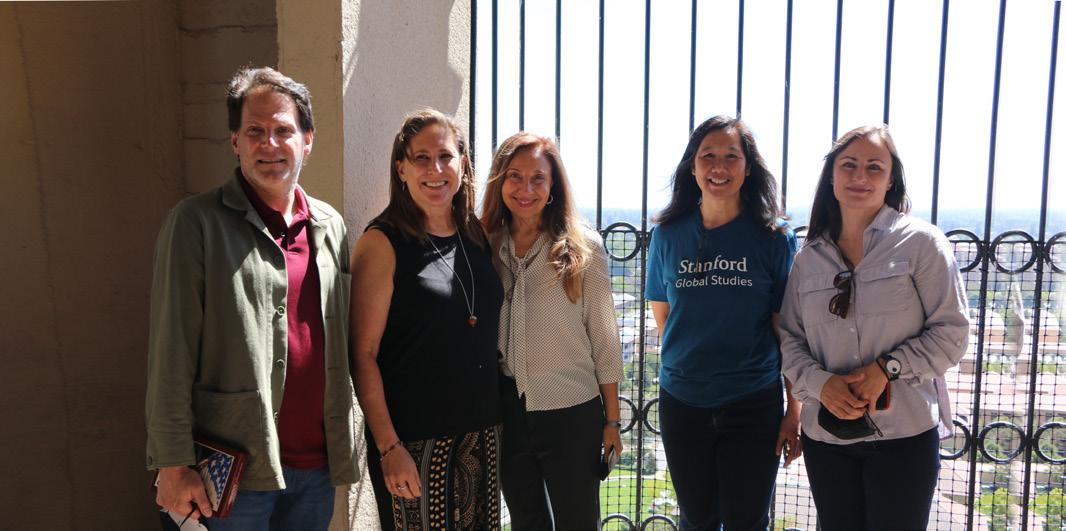

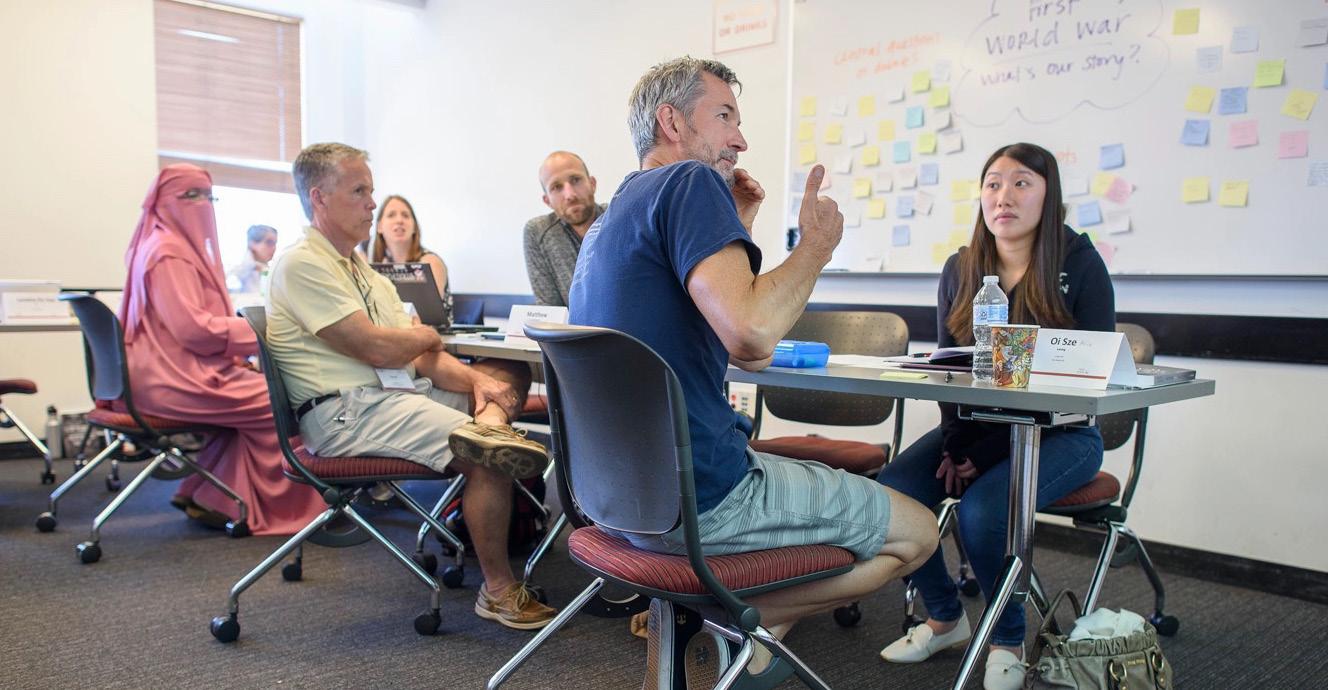
Contents 2 Table of Contents 3 Director’s Message 4 About the Title VI NRC Program 5 Title VI at Stanford 6 Foreign Language and Area Studies Training 7 EPIC Program 8 Educating Beyond Stanford 10 Professional Development for K-14 Educators 11 Faculty Engagement 12 Community College Outreach 14 Stanford University Libraries 15 Looking Ahead 2 The Stanford Global Studies (SGS) Division is the university’s hub for education, research, and community engagement centered on exploring issues, societies, and cultures from a regional and global perspective. SGS is committed to outreach to foster global competencies, promote inclusive and equitable opportunities in global education, and share Stanford’s research expertise and educational resources with students and educators in our community and beyond.
photos
The
featured on the cover showcase events and outreach programs supported by Stanford’s Title VI National Resource Centers, including workshops, symposia, and learning institutes for K-12 and community college students and educators.
Dear Colleagues and Friends,
I am delighted to share Education Partnerships at Stanford and Beyond , which provides an overview of our community outreach initiatives supported by Title VI funding from the U.S. Department of Education. As we look back on the past eight years, I extend my gratitude to the dedicated staff and faculty across the university who tirelessly support these initiatives and continue to innovate how we can extend our reach beyond Stanford.
Embedded in the fabric of Stanford’s vision is a commitment to engaging with partners beyond our campus to learn from and give back to our community. One of our highest priorities at SGS is outreach that promotes global education and cross-cultural learning. Through our outreach programs, we share resources and expertise with students and educators in the community that deepen the understanding of key regions, cultures, languages, and global issues. This programming would not be possible without funding from the Title VI National Resource Centers (NRC) program, which is administered by the International and Foreign Language Education Office of the U.S. Department of Education and operates on a four-year grant cycle. This unique program provides grants to universities to operate international studies centers that broaden opportunities for instruction and research on world regions and issues, strengthen training in foreign language and area studies, and lead programming to internationalize K-14 curricula.
The pages that follow showcase highlights from the last two grant cycles across Stanford’s NRCs: The Center for East Asian Studies (CEAS), the Center for Latin American Studies (CLAS), and the Center for Russian, East European & Eurasian Studies (CREEES). These centers have collaborated with partners in the Graduate School of Education, the Freeman Spogli Institute for International Studies, and Stanford Libraries, among others, on more than 80 events and initiatives.
In 2013, the NRCs established the Education Partnership for Internationalizing Curriculum (EPIC), which offers a range of dynamic programs for community college and K-12 educators and students that foster global competencies. Students and educators from more than 115 institutions around the country have participated in EPIC programs, which include a fellowship for community college faculty interested in internationalizing the curriculum at their home institutions, a fair for community college students to learn about international career paths, and professional learning institutes for K-14 educators that cover a variety of topics—from food insecurity to world religions to global migration.
Director’s Message

In addition to outreach programming, Stanford’s NRCs play a key role in supporting language and area studies training. Since 2014, they have provided over $10 million in Foreign Language and Area Studies (FLAS) fellowships to more than 250 students who have studied crucial less commonly taught languages such as Haitian Creole, Kazakh, and Cantonese.
In summer 2022, we received the exciting news that CEAS, CLAS, and CREEES, as well as the SGS division, were designated as NRCs. This renewal will allow us to continue valuable partnerships with local community colleges and high schools, offer a diverse range of language and globally-focused courses, and provide student support for intensive language study. In addition, we are looking forward to establishing new programs in collaboration with internal and external partners, including Stanford Human-Centered Artificial Intelligence, Stanford Teacher Education Program, San Jose State University, and Howard University, to name a few.
In today’s global landscape, the NRCs play an increasingly important role. Stanford’s NRCs foster vibrant intellectual communities for students and faculty across the humanities, social sciences, natural sciences, and professional schools. The interdisciplinary, transregional scholarship that takes place in many of these centers is essential to tackling many contemporary challenges and preparing the next generation of students to lead in the world.
I would like to thank all of those involved in expanding outreach that catalyzes global learning. Our work depends on collaboration between institutes, programs, and research areas across the university, as well as members of the wider community. With your help, we look forward to another successful four-year cycle.
Jisha Menon
The Sakurako and William Fisher Family Director of the Stanford Global Studies Division; Professor of Theater and Performance Studies and, by courtesy, of Comparative Literature
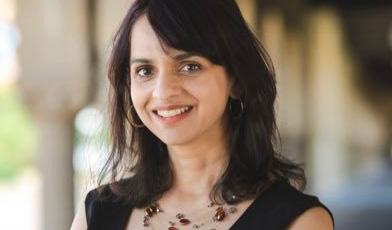
3 3
What?
About the Title VI NRC Program
The Title VI National Resource Centers (NRC) program is administered by the International and Foreign Language Education Office of the U.S. Department of Education.
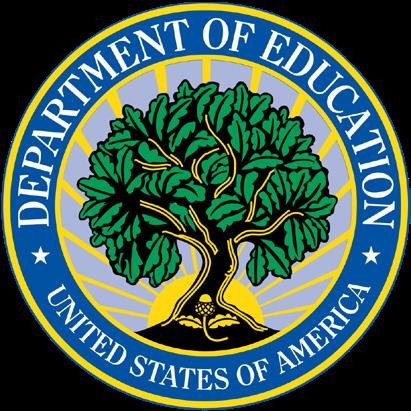
The program provides grants to institutions of higher education to establish, strengthen, and operate language and area or international studies centers that serve as national centers of excellence for teaching any modern foreign language. Grants also support instruction in fields needed to provide a full understanding of the areas, regions, or countries where the languages are commonly used; research and training in international studies; language aspects of professional and other fields of study; and instruction and research on issues in world affairs.
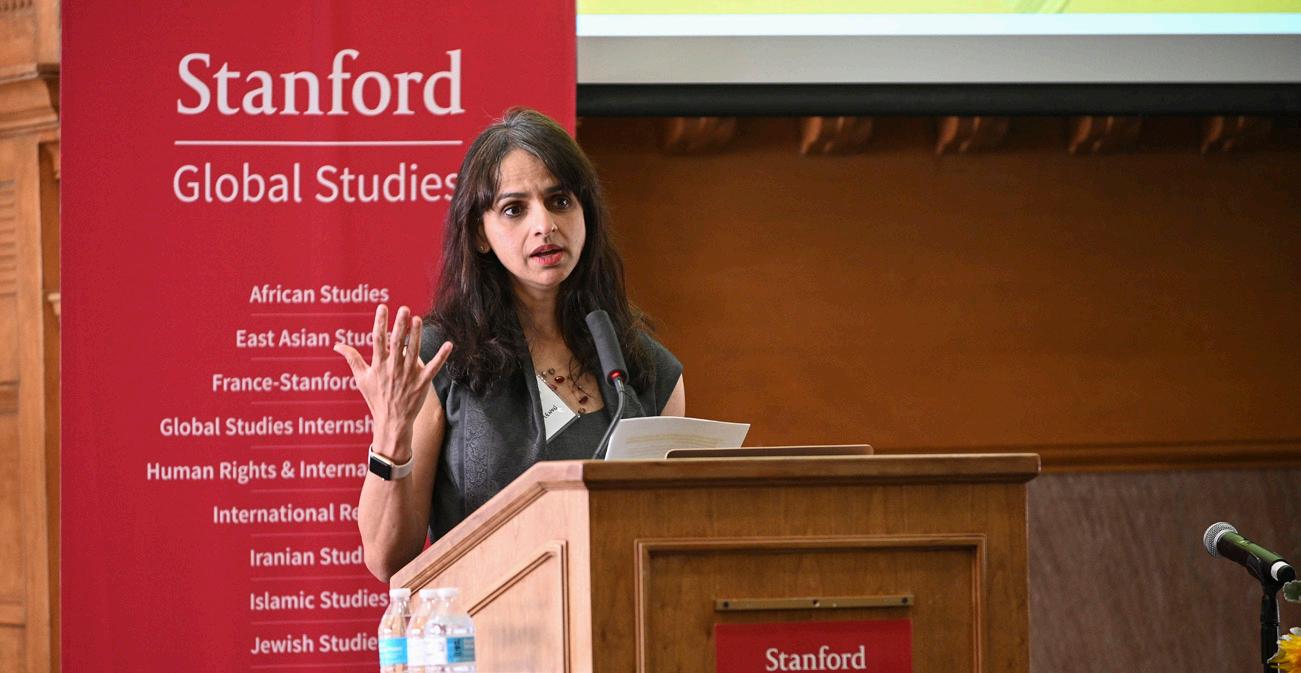
When?
This program operates on a four-year grant cycle.
Where?
Centers may focus on the following world areas: Africa, Canada, East Asia, Latin America, Middle East, Russia and Eastern Europe, South Asia, Southeast Asian and Pacific Islands, and Western Europe. Applicants may also propose centers that focus on international themes.
“The NRCs
and faculty
the humanities, social sciences, natural sciences, and professional schools. The interdisciplinary, transregional scholarship that takes place in these centers is essential to tackling many contemporary challenges, including climate change, infectious disease, and migration. In a complex, interconnected world, the role of the NRCs has never been more critical.”
4
SGS Director Jisha Menon speaking at the 2022 Education Partnership for Internationalizing Curriculum (EPIC) Symposium.
foster vibrant intellectual communities for students
across
— Jisha Menon, Fisher Family Director, Stanford Global Studies
Title VI at Stanford
The Stanford Global Studies Division is home to 14 centers and programs in the School of Humanities and Sciences. In 2022, the U.S. Department of Education designated Stanford Global Studies, and three of its centers, as Title VI National Resource Centers: the Center for East Asian Studies, the Center for Latin American Studies, and the Center for Russian, East European and Eurasian Studies.
NRCs are essential to the development of expertise in critical languages and cultures, as well as to fostering international education. Stanford’s NRCs:
• Collaborate on programs to internationalize K-14 curricula
• Provide opportunities for instruction and research on critical regions, global issues, and less commonly taught languages
• Offer professional development opportunities for high school and community college instructors and students
• Strengthen access to training in modern foreign languages and area studies
Title VI NRC Leadership
Stanford Global Studies
• Jisha Menon, Sakurako and William Fisher Family Director
• Katherine Kuhns, Executive Director
• Donna Even-Kesef, Division Manager
• Kristyn Hara, Academic and Outreach Manager
Center for East Asian Studies
• Dafna Zur, Director
• John Groschwitz, Associate Director
• Ekaterina Mozhaeva, Events and Communications Officer
Center for Latin American Studies
• Alberto Diaz-Cayeros, Director
• Elizabeth Sáenz-Ackermann, Associate Director
• Molly Aufdermauer, Public Engagement Coordinator
• Megan Bonilla, Academic and Student Services Officer
• Sara Clemente, Events and Communications Officer
Center for Russian, East European and Eurasian Studies
• Amir Weiner, Director
• Jovana Lazić Knežević, Associate Director
• Noura Khaled, Program Coordinator
• Nelia Lanets, Student Services Officer
Collaborators
Stanford’s NRCs collaborate with several units across the university on outreach programming:
Center for Spatial and Textual Analysis (CESTA)
• Fyza Parviz Jazra, Co-Director, Poetic Media Lab
• Nelson Schuchmacher Endebo, Ph.D. Candidate
• Ellis Schriefer, Ph.D. Candidate Center to Support Excellence in Teaching (CSET) in the Graduate School of Education
• Suzanne Burrows, Executive Director
• Tammy Wu Moriarty, Associate Director School of Humanities and Sciences
Stanford History Education Group (SHEG) in the Graduate School of Education
• Joel Breakstone, Director
• Teresa Ortega, Associate Director
• Mark Smith, Director of Assessment
Stanford Institute for Human-Centered Artificial Intelligence (HAI)
• John Robichaux, Director of Education
• Haifa Badi Uz Zaman, Program Manager for DEI Stanford Language Center
• Elizabeth Bernhardt-Kamil, Director
Stanford Program on International and Cross-Cultural Education (SPICE) in the Freeman Spogli Institute for International Studies
• Gary Mukai, Director
• Jonas Edman, Instructional Designer Stanford Teacher Education Program (STEP)
• Ira Lit, Program Director
• Sarah Levine, Assistant Professor, GSE Stanford University Libraries
Faculty Affiliates
Affiliated faculty come from more than 45 departments at Stanford, including biology, business, classics, computer science, earth sciences, electrical engineering, emergency medicine, history, law, and theater and performance studies.
5
5
Foreign Language and Area Studies Training
Stanford’s NRCs support the teaching of modern foreign languages, including many less commonly taught languages, in conjunction with instruction about the world regions where these languages are used.
FLAS Fellowships
Three Stanford NRCs provide Foreign Language and Area Studies (FLAS) fellowships to support the study of modern foreign languages among undergraduate and graduate students: the Center for East Asian Studies, the Center for Latin American Studies, and the Center for Russian, East European and Eurasian Studies.
FLAS fellowships are a key component of graduate support at Stanford, helping draw some of the strongest area studies students to campus. FLAS funding trains linguistically and culturally proficient graduates who educate thousands of students, policymakers, and members of the public over the course of their careers.
Since 2014, Stanford’s NRCs have provided over $10 million in funding to support 267 students who have studied 19 languages.
Languages studied by FLAS recipients:
• Albanian
• Armenian
• Cantonese
• Estonian
• Haitian Creole
• Japanese
• Kaqchikel Maya
• Kazakh
• Korean
• Mandarin
• Náhuatl
• Persian
• Polish
• Portuguese
• Quechua
• Russian
• Turkish
• Ukrainian
• Vietnamese
Support for Language Teachers
The Center for Latin American Studies (CLAS) offers several programs for language teachers, including:
Indigenous Languages of Latin America Workshops
CLAS offers workshops for instructors of Indigenous languages of Latin America to discuss curriculum design, pedagogy, and the use of technology in the Indigenous language classroom.
Computer
“Since I just graduated, I wanted to take the opportunity before I started my job to improve my Japanese. I had finished first year Japanese at Stanford but wanted to build a strong enough foundation in Japanese so that I could continue to make decent progress independently as a working professional. All kinds of people were at Middlebury—professionals whose jobs require speaking Japanese, undergraduates, graduate students doing research about Asia–but we were all united by our love of the language and culture.”
Indigenous language instructors at a workshop hosted by the Center for Latin American Studies.
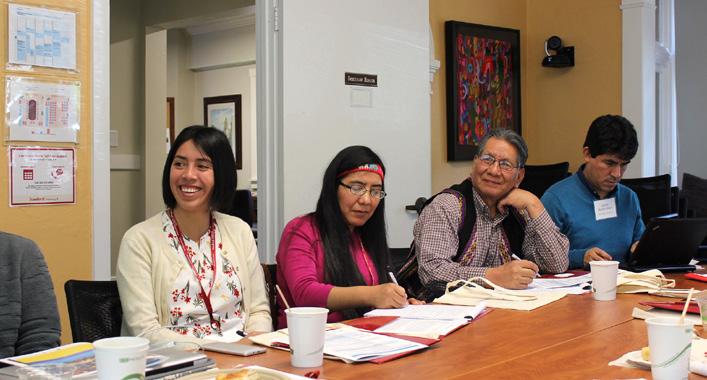
Lingua Portuguesa Program
This program brings together Spanish language instructors interested in incorporating the Portuguese language and culture into their school and district curricula.
Spanish Teachers Seminars
CLAS and the Stanford World Language Project offer a year-round professional development course to new and experienced teachers of Spanish for Heritage Learners.
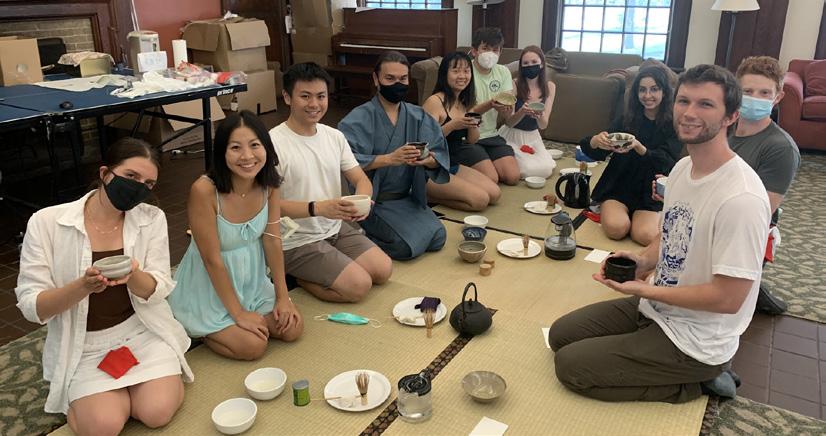
6
science major Meilinda Sun (second from left) received a FLAS Fellowship to study Japanese at Middlebury’s Summer Language School.
EPIC Program
In collaboration with other Stanford partners, the National Resource Centers established the Education Partnership for Internationalizing Curriculum (EPIC), which focuses on strengthening the internationalization of curricula and the professionalization of language instruction at community colleges and K-12 institutions.
EPIC offers several programs for K-14 educators and students:
• EPIC fellowship program for community college faculty interested in internationalizing the curriculum.
• EPIC leadership program for community college administrators interested in institutionalizing international education.
• EPIC symposium for community college faculty and staff to discuss ways to prepare students for an increasingly interconnected world.
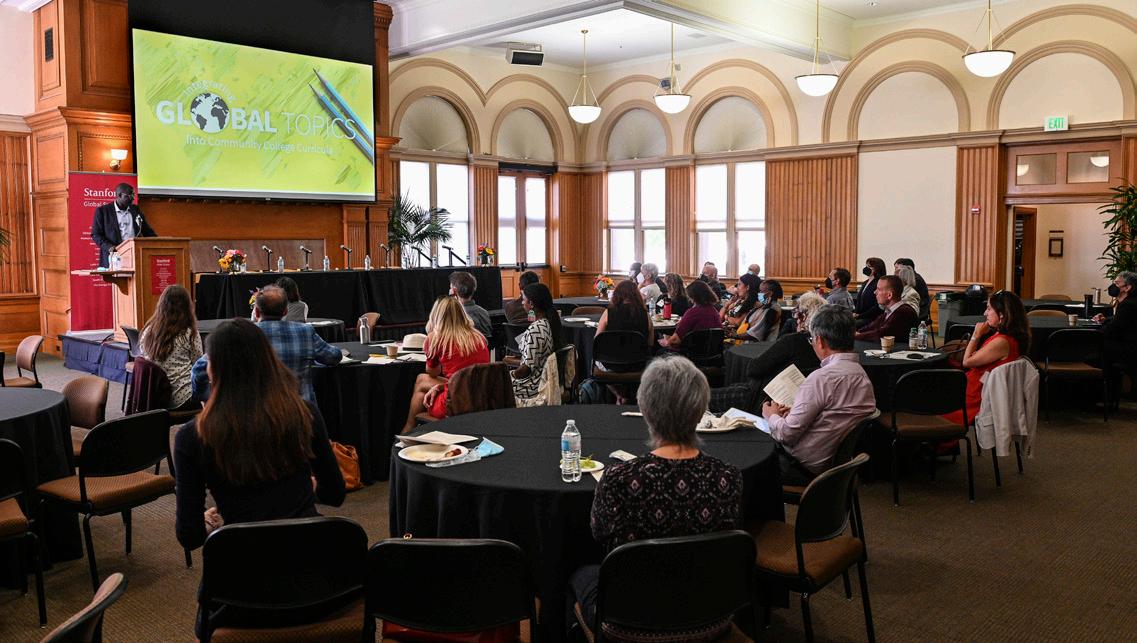
• Community college student fair for students interested in global studies and international career paths.
• Global educators network for community college faculty interested in networking and learning about educational resources and classroom strategies to catalyze transformational teaching.
• Teaching resources for K-14 educators, including a repository of past EPIC fellowship projects, curricular materials, and a collection of videos from Stanford scholars discussing contemporary issues and research in their fields of expertise.
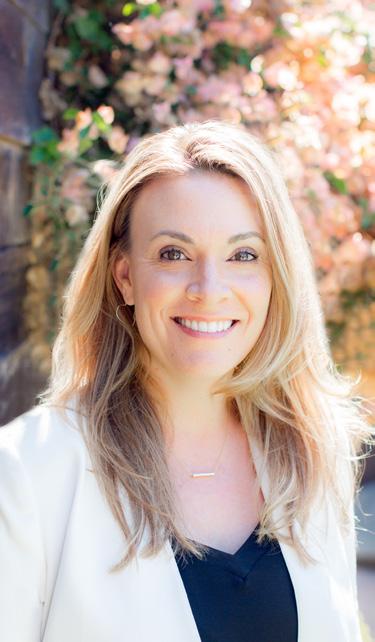
• Professional learning institutes for K-12 teachers interested in deepening their knowledge of key topics and honing their pedagogical expertise.
• Workshops for community college faculty that feature presentations by leading Stanford faculty on their latest research.
“My experience as an EPIC fellow allowed me to be creative, thoughtful, engaged, and supported. Because of my cohort and the Stanford faculty that mentored us, I felt encouraged to think more broadly and implement new ideas I may not have explored previously. The focus of my EPIC project was on internationalizing the business law curriculum. Since the EPIC fellowship, I accepted a position as a clinical professor of law and ethics at the University of San Diego. The project I completed as part of my fellowship has been useful as I continue to teach business law, and I’m thrilled the project was transferrable to most business law courses, regardless of the institution. The EPIC fellowship served as a wonderful foundation in exploring ways to diversify and internationalize the business law curriculum, which frankly hasn’t evolved significantly over the years. It has served as a stepping stone for new ideas and research projects as well.”
The 2022 EPIC Symposium took place on May 21 at the Bechtel Conference Center. Photo credit: Rod Searcey. Rebecca Nieman completed the EPIC fellowship in 2020-21 when she was an assistant professor of business at San Diego Mesa College.
7
Educating Beyond Stanford
Institutions of EPIC Program Participants
• American Military University
• American River College
• Bakersfield Community College
• Berkeley City College
• Berkshire Community College
• Burlingame High School
• Butte College
• Cabrillo College
• California State University at Northridge
• Cañada College
• Cerritos College
• Chabot College
• Chaffey College
• Cholla High School
• City College of San Francisco
• College of Alameda
• College of DuPage
• College of Marin
• College of San Mateo
• College of the Sequoias
• Contra Costa College
• Cosumnes River College
• Crafton Hills College
• Crystal Springs Uplands School
• Cuesta College
• Cypress College
• De Anza College
• Diablo Valley College
• Dougherty Valley High School
• East Los Angeles Community College
• East Side Union High School District
• El Camino College
• El Dorado Middle School
• Evergreen Valley College
• Faculty Association of California Community Colleges
• Feather River College
• Folsom Lake College
• Foothill College
• Fullerton College
• Gavilan College
• Golden West College
• Grossmont College
• Hoover Middle School
• Islamic Networks Group
• John Muir Middle School
• Kehillah Jewish High School
• Kentfield School District
• Lake Tahoe Community College
• Laney College
• Las Positas Community College
• Los Angeles Pierce College
• Los Medanos College
• Madera Unified School District
• Massasoit Community College
• Mendocino College
• Menlo School
• Merritt College
• MiraCosta College
• Miramar College Mission College Modesto Junior College Monterey Peninsula College
Mount Diablo Unified School District
• Mountain View Los Altos Union High School District
• National University
• Ohlone College
• Oregon Episcopal School
• Oxford University
• Pasadena City College
• Peralta Community College District
• Piedmont Unified School District
• Pierce College
• Pioneer Academics
• Porterville College
• Prospect Sierra School
• Queensborough Community College
• Quinsigamond Community College
• Reedley College
• Rio Hondo College
• Sacramento City College
• Sacred Heart Schools
• Saddleback College
• San Benito High School
• San Bernardino Valley College
• San Diego Mesa College
Human rights attorney Nicholas Opiyo delivered a keynote address at the 2022 EPIC symposium. In his speech, he emphasized the importance of learning about the world beyond the United States and discussed his journey from growing up in a small village in northern Uganda to becoming an international human rights lawyer.
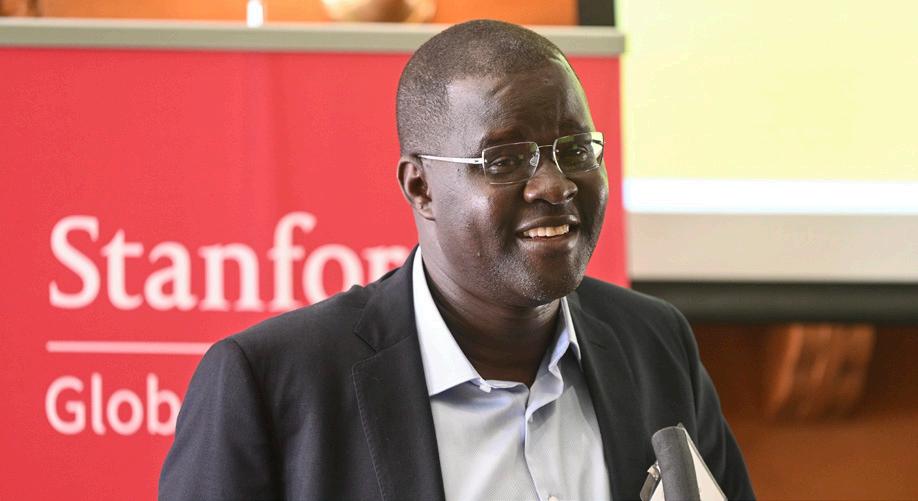
Oxford, UK
• San Francisco State University
• San Joaquin Delta College
• San Jose City College
• San Jose-Evergreen Community College District
• San Mateo County Community College District
• San Mateo Union High School District
• Santa Clara University
• Santa Monica College
• Santa Rosa Junior College
• Seattle Academy of Arts and Sciences
• Seattle Central College
• SIATech High School
• Sierra College
• Skyline College
• Solano College
• Southwestern College
• St. Philip’s College
• Stanford University
• Stevenson School
• Stratford Schools
• Summit Public Schools
• Silicon Valley Adult Education
• Taft Community College
• The Harker School
• U.S. Department of Education
• UC Berkeley
• UC Santa Barbara
• UCLA
• Uplift Education
• Victor Valley College
• West Valley College
• WestEd
• World University and School
• Yuba Community College
Top: In February 2020, SGS and the Center to Support Excellence in Teaching hosted a professional development course for K-14 educators that focused on strategies to teach students about world religions.
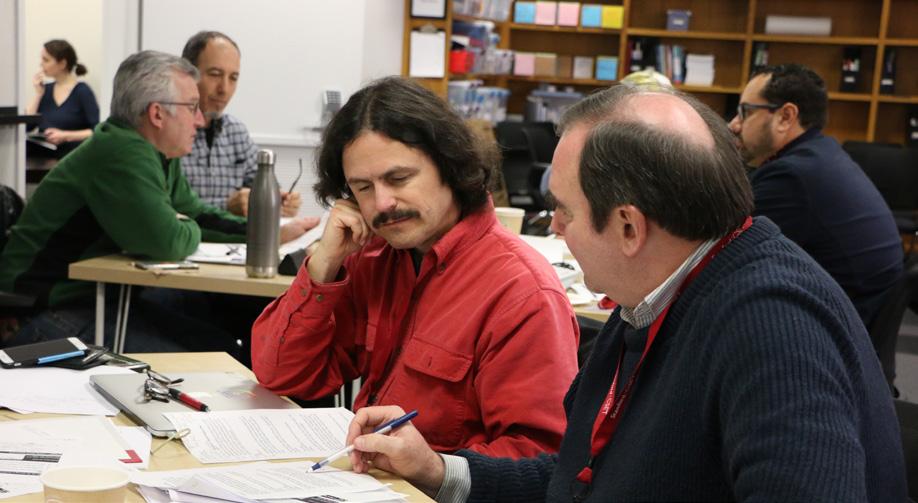
Bottom: Each year, community college faculty participating in the EPIC fellowship begin their program with a three-day workshop at Stanford, where they have an opportunity to explore key university resources, including the Hoover Institution Library and Archives, the David Rumsey Map Center, and the Cantor Arts Center (pictured).
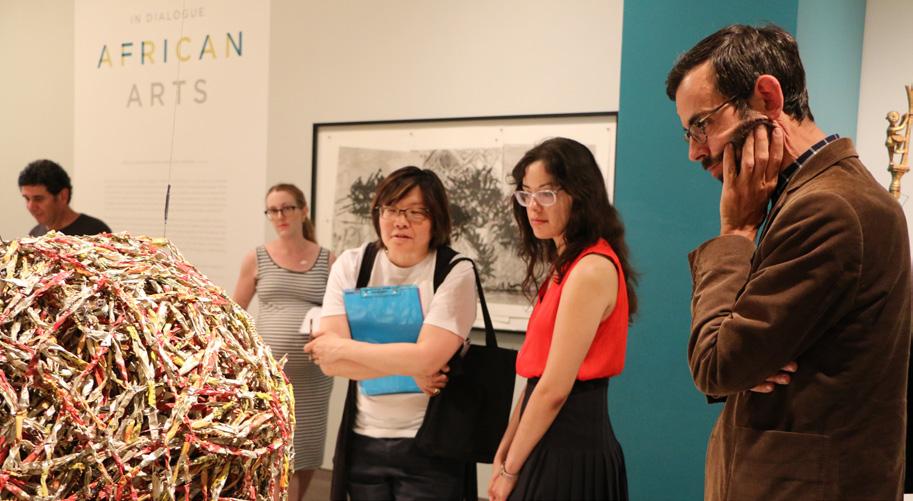
9
EPIC focuses on outreach in support of area and international studies, professional development for educators, and curriculum development at K-12 institutions and community colleges. Participants in our EPIC programs have hailed from more than 115 institutions across the United States.
Professional Development for K-14 Educators
Stanford’s NRCs, in partnership with the Center to Support Excellence in Teaching and the Stanford Program on International and Cross-Cultural Education, have provided professional development seminars, workshops, and institutes for K-14 educators that explore a wide range of global topics.
Since 2014, we have hosted more than three dozen institutes and workshops for local educators on topics including:
• Race and Rights in a Globalized World
• Identity and Citizenship
37 institutes and workshops 575 attendees
from
88 Schools
• Democracy Today: Where and What Is It?
• Immigration and Assimilation
• People on the Move: Global Migration in the Past and Present
• Infectious Diseases and Global Health
• Nuclear Risk and Nonproliferation
• Politics and Culture in Contemporary Iran
• Gender and Activism in Historical and Contemporary Contexts
• First World War in a Global Context
Summer Teacher Institutes
The Center for Latin American Studies, in partnership with other members of the Consortium of Latin American Studies Programs (CLASP), offers national and international summer institutes that are open to teachers across the country.
Top: Teachers Esther Mansdorf and Erin Wilson examine source materials at the Hoover Institution Library and Archives as part of a professional development course on teaching the history of World War I. Photo credit: Alex Shashkevich.
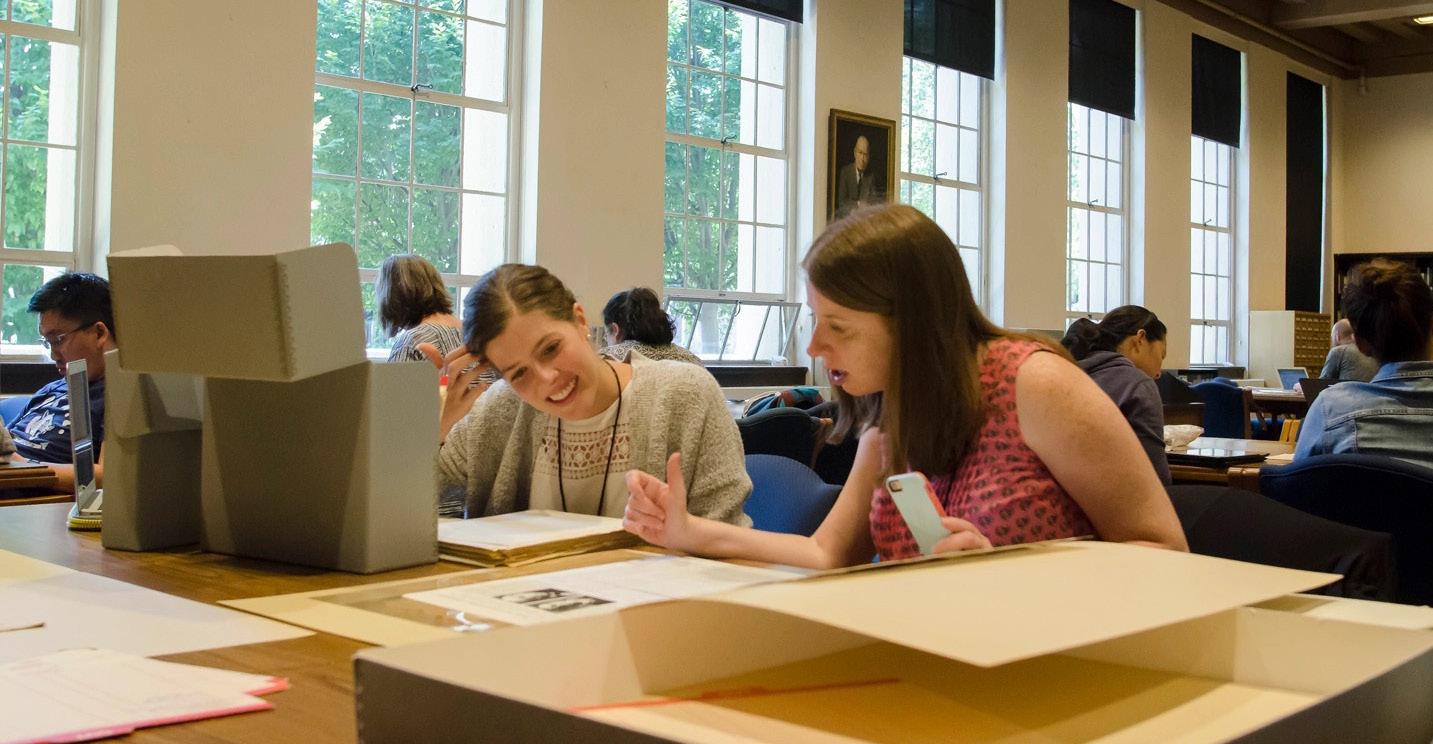
Bottom: Educators participating in a course on the Russian Revolution view Soviet posters from the Hoover Library and Archive collection on display at the Cantor Art Museum.

Faculty Engagement
More than 40 Stanford faculty have presented their latest research at workshops, symposia, and institutes for K-14 faculty and students, including:
David Abernethy
Professor of Political Science, Emeritus
Samer Al-Saber
Assistant Professor of Theater and Performance Studies
Anna Bigelow
Associate Professor of Religious Studies
Coit Blacker
Olivier Nomellini Professor in International Studies
Thomas Blom Hansen
Reliance-Dhirubhai Ambani Professor of Anthropology
Gordon Chang
Olive H. Palmer Professor in Humanities; Professor of History
Martha Crenshaw
Senior Fellow, FSI; Professor, by courtesy, of Political Science
Robert Crews
Professor of History
Larry Diamond
Senior Fellow, Hoover Institution; Mosbacher Senior Fellow in Global Democracy, FSI
Alberto Diaz-Cayeros
Senior Fellow, FSI; Professor, by courtesy, of Political Science Rodolfo Dirzo
Bing Professor in Environmental Science; Professor of Earth System Science
Pascaline Dupas
Kleinheinz Family Professor of International Studies; Senior Fellow, SIEPR; Professor of Economics
Carol Dweck
Professor of Psychology and, by courtesy, of Education
Walter Falcon
Helen C. Farnsworth Professor of International Agricultural Policy, Emeritus
James Fishkin
Janet M. Peck Chair in International Communication; Professor of Communication and, by courtesy, of Political Science
Francis Fukuyama
Olivier Nomellini Senior Fellow, FSI; Professor, by courtesy, of Political Science
Andrew G. Walder
Professor of Sociology and, by courtesy, of Political Science; Senior Fellow, FSI
Miyako Inoue
Associate Professor of Anthropology and, by courtesy, of Linguistics
Usha Iyer
Assistant Professor of Art and Art History
Saumitra Jha
Associate Professor of Political Economy; Senior Fellow, FSI and SIEPR
Tomás Jiménez
Professor of Sociology
Pavle Levi
Osgood Hooker Professor of Fine Arts; Associate Professor of Film and Media Studies
Herbert Lin
Senior Research Scholar, CISAC
Rachel Lotan
Professor of Education, Emerita
Yvonne Maldonado
Taube Professor of Global Health and Infectious Diseases; Professor of Pediatrics and of Epidemiology and Population Health
Michael McFaul
Ken Olivier and Angela Nomellini Professor of International Studies in the Department of Political Science; Peter and Helen Bing Senior Fellow at the Hoover Institution
Jisha Menon
Professor of Theater and Performance Studies and, by courtesy, of Comparative Literature
Abbas Milani
Research Fellow, Hoover; Adjunct Professor, Iranian Studies
Christine Min Wotipka
Associate Professor of Education and, by courtesy, of Sociology
Anna Bigelow gave a lecture on India’s diverse religious landscape at a professional learning institute for K-12 educators on “Understanding the World Through Religion.”
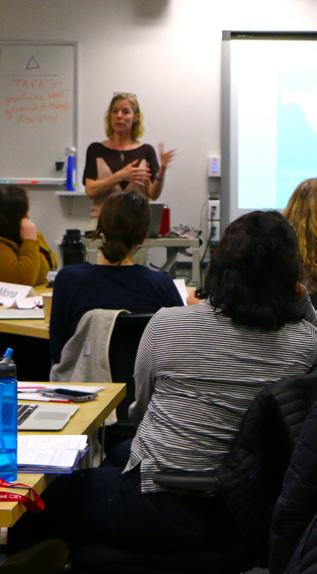
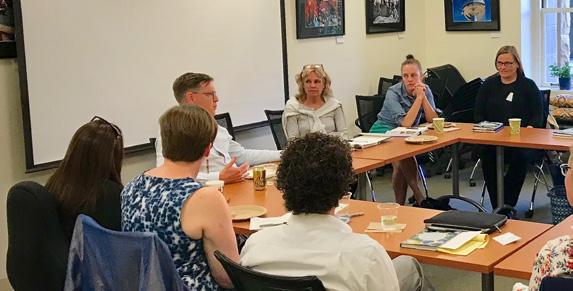
Ian Morris
Jean and Rebecca Willard Professor of Classics
Norman Naimark
Robert and Florence McDonnell Professor of East European Studies; Professor, by courtesy, of German Studies; Senior Fellow, by courtesy, at Hoover Institution and FSI
David Palumbo-Liu
Louise Hewlett Nixon Professor; Professor of Comparative Literature and, by courtesy, of English
Jennifer Pan
Professor of Communication; Senior Fellow, FSI
William Perry
Michael and Barbara Berberian Professor; Senior Fellow, FSI, Emeritus
Steven Pifer
William J Perry Fellow, FSI
Francisco Ramirez
Vida Jacks Professor of Education and, by courtesy, of Sociology
Jonathan Rosa
Associate Professor of Education
Richard Saller
Kleinheinz Family Professor of European Studies; Professor, by courtesy, of History
Richard Saller gave the keynote address at the 2019 EPIC Symposium, titled “Beyond Eurocentrism at Stanford.”
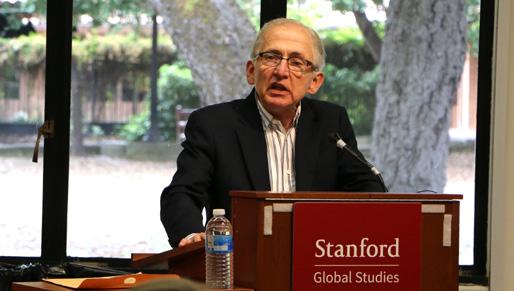
Daniel Schwartz
James Quillen Dean and Nomellini & Olivier Professor of Educational Technology
Robert Siegel
Professor of Microbiology and Immunology
Mitchell Stevens
Professor of Education
Sharika
Thiranagama
Associate Professor of Anthropology
Jeremy
Weinstein
Professor of Political Science; Senior Fellow, FSI
Kären
Wigen
Frances and Charles Field Professor of History
Mikael Wolfe
Associate Professor of History
Usha Iyer gave the keynote address at the 2018 EPIC Symposium, titled “Teaching Indian Cinema in Trinidad: Rethinking Globalization Paradigms.”
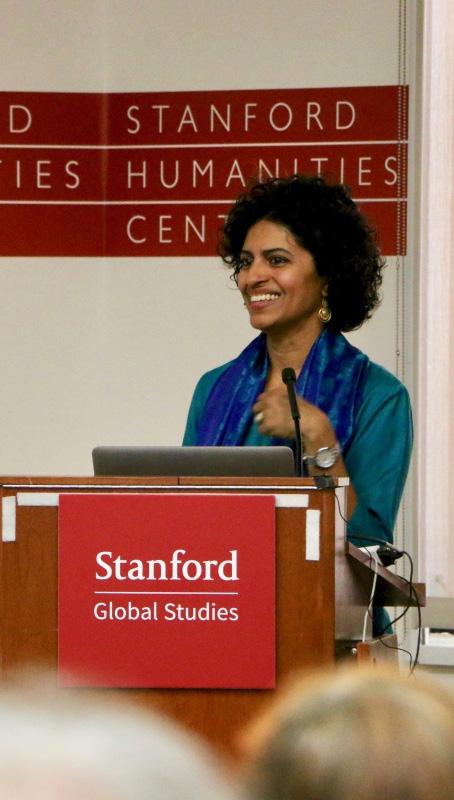
11
Mitchell Stevens shared insights from his book Seeing the World: How U.S. Universities Make Knowledge in a Global Era with the 2018-19 EPIC fellows.
Community College Outreach
SGS offers several key programs for community college faculty, administrators, and students.
Community College Faculty Fellowship Program
Each year, Stanford Global Studies welcomes a cohort of 10 community college faculty fellows from schools across California and the United States. Throughout the year, the fellows develop projects that aim to incorporate global perspectives and intercultural learning into the courses they teach at their home institutions. The fellowship culminates in a symposium in the spring, which is attended by faculty and staff from universities and community colleges across the country.
participants have attended 6 EPIC symposia 80
community college faculty from 36 institutions have participated in the EPIC fellowship program
“I believe it’s important for all educators to engage in global education. It helps our students to gain empathy and perspective. Community colleges serve the most diverse student populations, from high schoolers to returning nontraditional students. We have large populations of military students, parents, undocumented students, and low-income students. Engaging in global education helps us to better serve and meet the needs of our student populations and to grow as educators.”
— Allison Tripp, one of the 2022-23 EPIC fellows
EPIC fellows have represented 31 academic disciplines and reached more than 140,000 students across the country
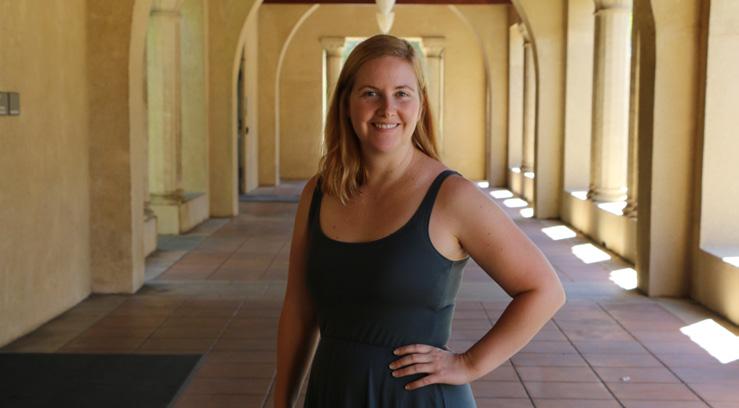
415
12
Community College Student Fair
Since 2021, SGS has hosted an annual fair for community college students that aims to provide students an opportunity to discover pathways to international work, learn about the importance of developing a global mindset, and build connections with others interested in global studies. More than 125 students from 25 community colleges have attended the day-long event, which features workshops and presentations led by Stanford faculty and scholars.
Global Educators Network
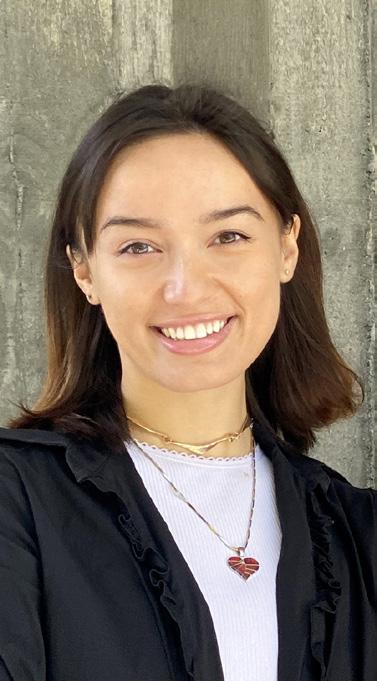
Established in 2020, the Global Educators Network (GEN) is led by former EPIC fellows and is open to community college instructors worldwide. Through conferences, workshops, social events, and staff development, GEN seeks to provide educational resources and classroom strategies that can catalyze transformational teaching. Working across disciplines and beyond classroom walls, GEN helps to connect diverse campuses and learning communities nationwide, engaging faculty and students of all backgrounds, ages, and interests in a shared community of international inquiry.
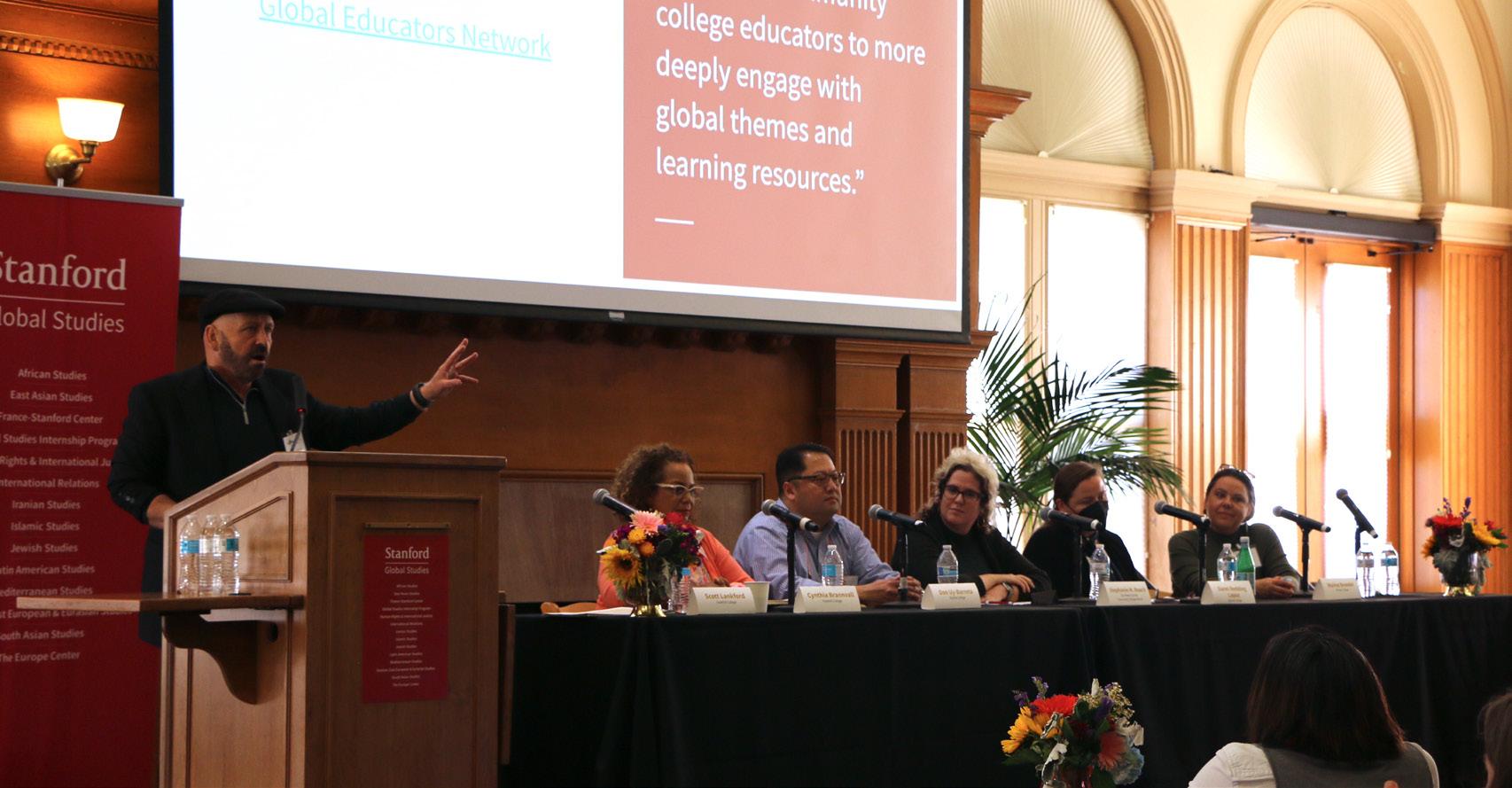
“It was exciting to meet other community college students who are also interested in global perspectives, many of whom are firstgeneration Americans like me. Sometimes it’s hard for me to even imagine having a global career since I have lived in the same town almost my whole life and attend my local community college but brainstorming and connecting with these other students inspired me to realize that we all are capable of making an impact on a larger scale.”
13
— Emma Neal, College of Marin
Stanford University Libraries
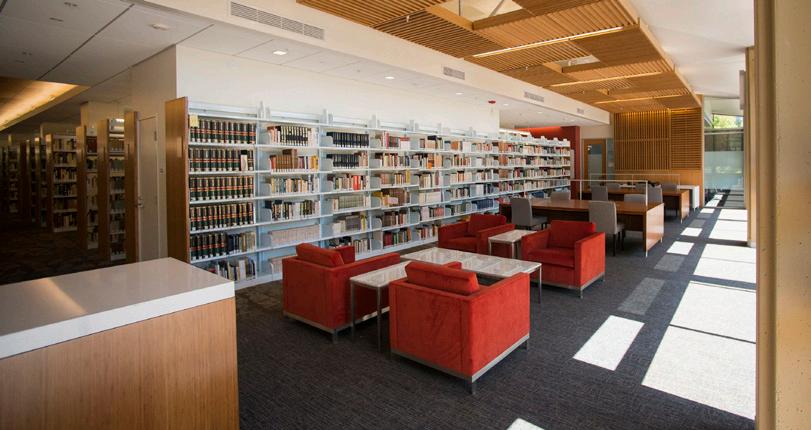
Stanford’s NRCs provide support for library staff and the acquisition of library materials related to their respective world areas. They also engage in cooperative arrangements with libraries worldwide to ensure that research materials are widely available to students, teachers, and specialists at Stanford and beyond.
Library Access Grants
The Center for Latin American Studies and Stanford University Libraries offer library access grants for faculty from U.S. minority serving institutions (MSIs) and community colleges to conduct research relating to Latin America.
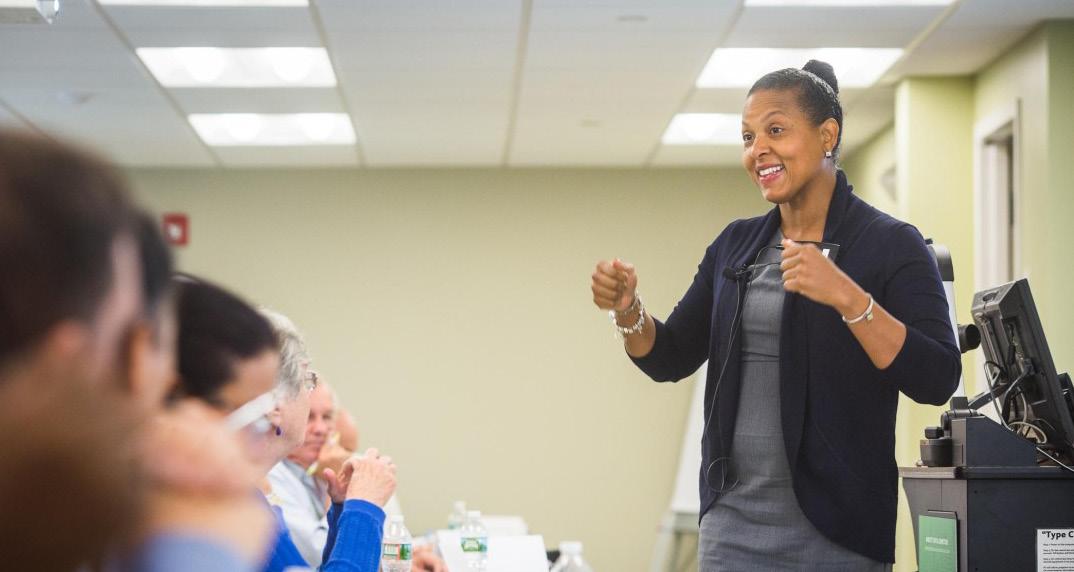 Susan Perkins, Associate Professor of Strategic Management, University of Illinois - Chicago
Susan Perkins, Associate Professor of Strategic Management, University of Illinois - Chicago
Top: Susan Perkins. Photo credit: Regions Bank
Right: East wing of Green Library. Photo credit: Andrew Brodhead.
Exhibitions
In December 2018, the Center for East Asian Studies collaborated with the East Asia Library at Stanford on an exhibition, Hand and Eye: Contemporary Reflections of East Asian Ceramic Traditions. The exhibition featured historic and contemporary works by Japanese, American, and Stanford artists.
Sansei Suzuki crafted the traditional sake cup on the left and Kato Tsubusa produced the contemporary teacup on the right.
“My research on Brazilian corporate governance and ownership structures was advanced tremendously in the summer of 2019 through the Library Access Grant. My interest in studying Brazilian firms’ shareholder agreements, acordo de acionistas, usually means that I have to travel to Brazil and search for this data within government regulatory agency libraries of the securities and exchange commission in Rio de Janeiro or the BOVESPA stock exchange in Sao Paulo. For me, coming to the Stanford Libraries was a game changer in how I conduct my research. Thanks to the generosity of this grant, I did not have to make the international research trip to Brazil. During my visit in the month of July 2019, I was able to gain access to the extensive library collection of books, articles, and databases sourced from Brazil on firms’ corporate governance, regulations, laws, and ownership practices throughout Latin America.”

14
Looking Ahead
the country in their teaching about Latin America, explained Elizabeth Sáenz-Ackermann, the center’s associate director. “We are particularly excited about our new partnership with the Connie L. Lurie College of Education at San Jose State University, which will expand professional development opportunities for pre-service and in-service teachers.”
In 2022-23, four community college administrators are participating in the inaugural EPIC leadership program.
In summer 2022, the U.S. Department of Education selected four SGS centers as Title VI NRCs. The Center for East Asian Studies, the Center for Latin American Studies, and the Center for Russian, East European and Eurasian Studies were designated as NRCs in their respective world areas. In addition, for the first time, SGS earned a designation as an International NRC. Collectively, these centers will bring in more than $7 million over the course of the four-year grant period.
Each center was required to demonstrate the quality and breadth of their course offerings and language programs, the strength of their library collections, and the university’s commitment to the subject area. Only 63% of the 155 proposals received
funding, making this grant cycle highly selective.
“Critically, this funding will enable us to continue offering a diverse range of outreach activities and expand opportunities for K-12 educators, community college faculty and students, and the public,” said Kristyn Hara, SGS academic and outreach manager. “We are especially excited to launch a new leadership program for administrators at community colleges and minority serving institutions who are committed to building institutional capacity and advancing innovative programming in support of international education.”

The Center for Latin American Studies plans to use this grant to strengthen its work as a research center and establish new partnerships to support educators across
“The grant will enable us to secure advanced level instruction of languages and new course offerings on countries and regions that dominate the current global news,” said Professor Amir Weiner, director of the Center for Russian, East European and Eurasian Studies. “This applies to languages that are in high demand yet have been less commonly taught, such as Ukrainian, Polish, and Kazakh. New team-taught, interdisciplinary courses such as From Plato to NATO: History, Politics, and Culture of the Eurasian World and Protest and Dissent in the Post-Soviet Union will expand our curriculum and aim at larger audiences than ever, from first-year students in the COLLEGE program to graduate students.”
In the Center for East Asian Studies, FLAS fellowships will support master’s students researching in diverse areas such as the semiconductor market, China’s foreign policy in South Asia, and U.S.-Korea relations, added center associate director John Groschwitz. “We are excited and proud to be expanding access to global research and teaching to our students—and students and educators throughout the state and across the nation—as an NRC.”
15
Four SGS centers receive federal funding to support international research, education, and outreach
Connect with us @StanfordGlobal @Stanford.Global Stanford Global Studies Division stanfordglobalstudies@gmail.com sgs.stanford.edu @StanfordGlobalStudies
OF HUMANITIES
SCIENCES
SCHOOL
AND
































 Susan Perkins, Associate Professor of Strategic Management, University of Illinois - Chicago
Susan Perkins, Associate Professor of Strategic Management, University of Illinois - Chicago

